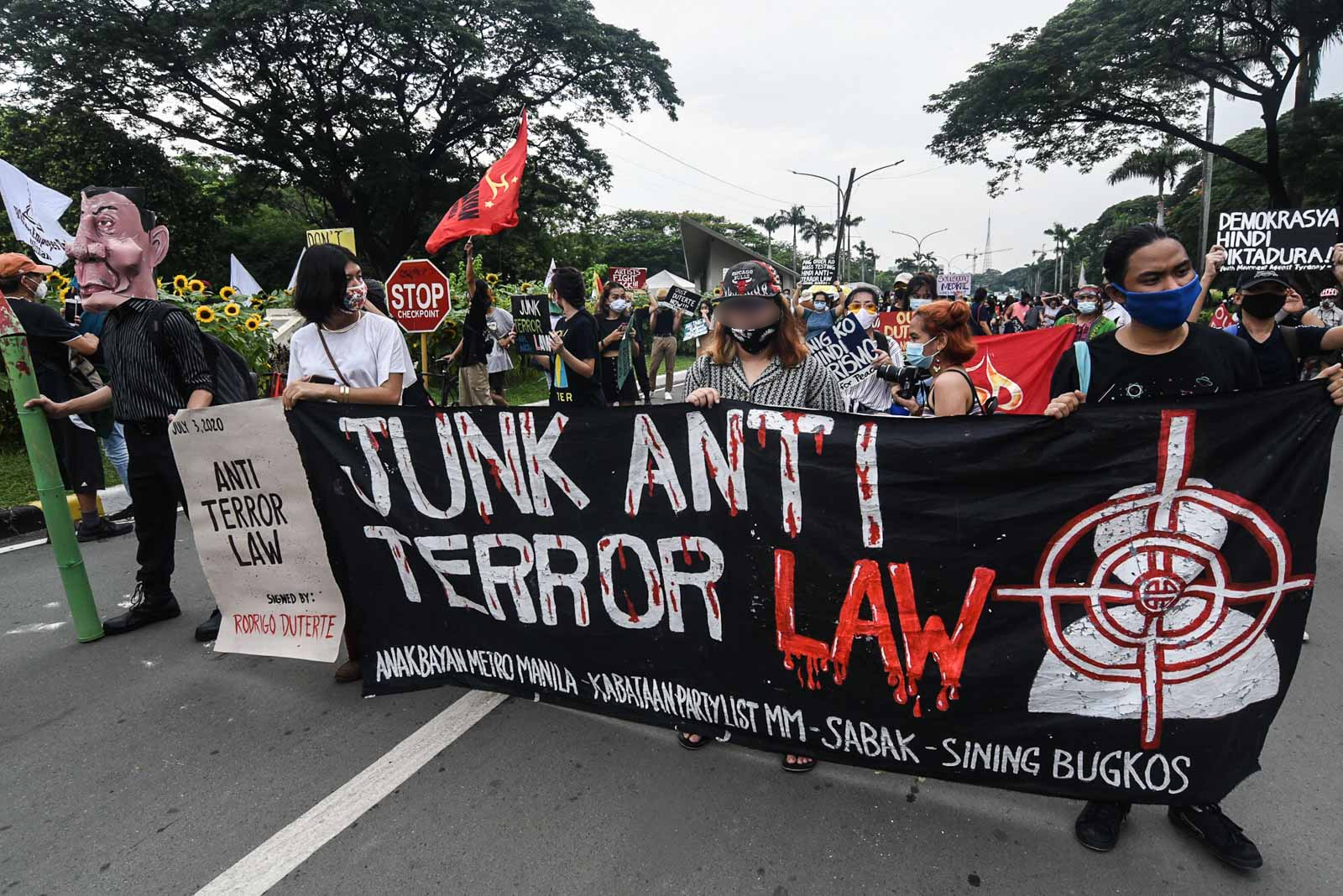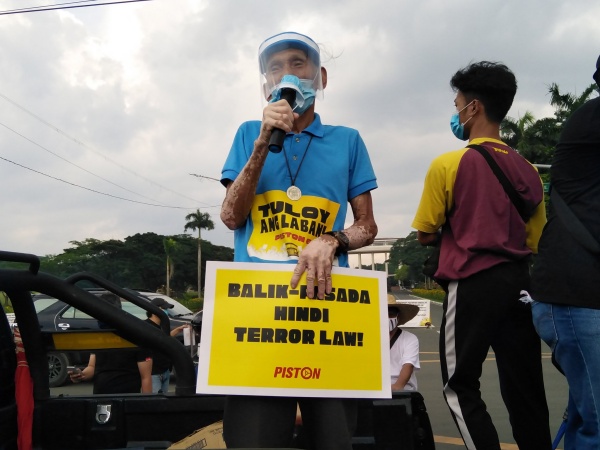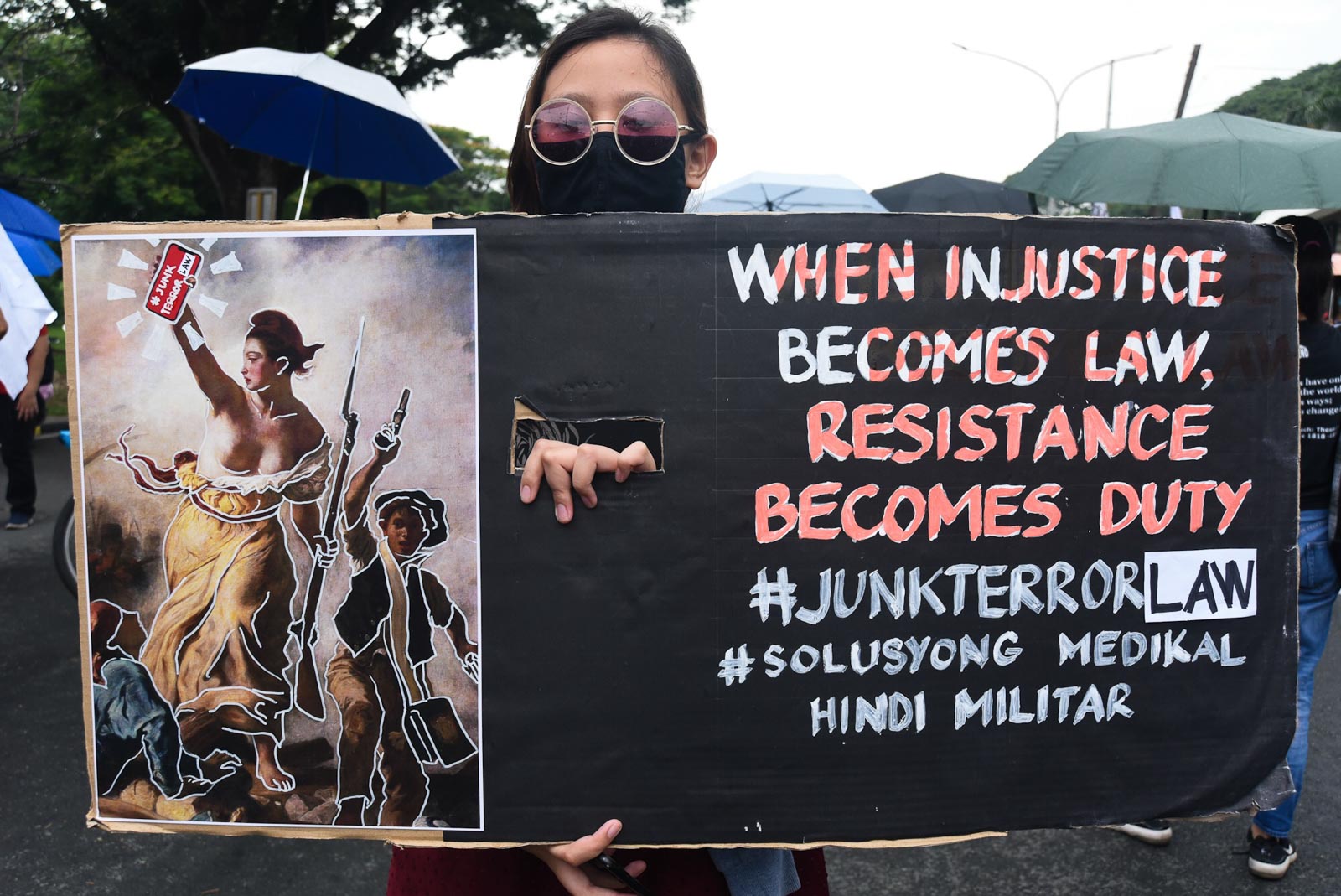
MANILA, Philippines – Several youth and sectoral groups took their outrage to the streets Saturday, July 4, a day after President Rodrigo Duterte signed the anti-terrorism law in complete disregard of widespread opposition from the public.
In an indignation protest held on Saturday at the University of the Philippines (UP) Diliman, protesters were seen observing physical distancing as they carried placards and chanted slogans to express their strong condemnation against the law.
Need for stronger voice
Gabriela Youth representative Clarice Palce stressed the importance for a stronger public clamor now that the controversial measure was signed into law. (READ: 'Ready to fight for civil rights': Sectoral leaders hold protest vs anti-terrorism law)
She also urged the public to continue fighting for the democratic rights of Filipinos.
“Normal na kabahan at matakot tayong mamamayan sa pagpapasa ng anti-terror law pero higit na mas kinakailangang tumindig ang sambayanan upang ipabasura ang batas na susupil sa ating karapatan,” Palce added.
(It is normal for citizens to be afraid with the signing of the anti-terror law but we must now all the more to stand firm in our call to junk the law that would curtail our freedoms.)
Palce also recalled the arrest of at least 20 individuals participating in a protest to celebrate Pride month and to oppose the then anti-terrorism bill. She added that the police's action was a preview of what would happen once the law takes effect.
Preview from the past
This is not the first time police arrested protesters during the pandemic, even if they did not violate quarantine rules.
Six jeepney drivers from transport group Piston were also arrested for allegedly failing to practice physical distancing during a protest and supposedly resisting authorities.
One of them, 72-year-old Elmer Cordero, also joined the indignation rally in UP. He said that a lot of Filipinos, especially from the public transport sector experience hardships under the Duterte administration, especially since the proposal and passage of the anti-terrorism law.

Also called “Tatay Elmer” on social media, he fears the law would be used against the poor who only want to make a living.
"Nagtipon lang kami sa kalsada noon para manawagan sa kapwa namin driver, kinulong na kami. Paano pa ngayon na pasado na?,” Cordero added.
(We were just gathering in the streets to call on our fellow drives, but we were jailed. What more now that the bill has been signed into law?)
Kalipunan ng Damayang Mahihirap (Kadamay) National member Mimi Doringo echoed this, recalling the harassment and intimidation of state forces under the Duterte administration to silence the call of the urban poor that their fundamental rights and safety be respected.
Domingo expressed how Kadamany has been red-tagged and harassed under the Duterte administration. She also recalled the killing of longtime Kadamay leader Carlito Badion, who was found dead in Ormoc City last May 28.
Badion was at the forefront of Kadamay’s occupation campaign of idle houses in Pandi, Bulacan in 2017. In 2018, Duterte threatened Kadamay with violence from the elite Special Action Force if they continued their bid to take over government housing units.

Questionable provisions
Other sectoral groups questioned the law citing how it provided more harm to the people than good.
Lawyer Krissy Conti of the Concerned Lawyers for Civil Liberties and National Union of Peoples' Lawyers cited two "troubling characteristics” of the anti-terror law: the vagueness and over broadness of its provisions.
Several groups are expected to challenge the anti-terror law before the Supreme Court, the first petition was filed by a group of lawyers and civic leaders, including Howie Calleja and Brother Armin Luistro.
Congress of Teachers/Educators for Nationalism and Democracy member Bryan Placido pointed out that surveillance, as sanctioned by anti-terror law, could be easier with classes now being migrated to remote learning setups.
Meanwhile, Bayan Muna Representative Ferdinand Gaite called the government out on its misguided priorities while demands such as mass testing remain unheeded.
Groups such as Karapatan, Bukluran ng Manggagawang Pilipino, League of Filipino Students, Concerned Artists of the Philippines, National Council of Churches in the Philippines also joined the indignation rally. – with reports from Philippine Collegian and UPLB Perspective/ Rappler.com